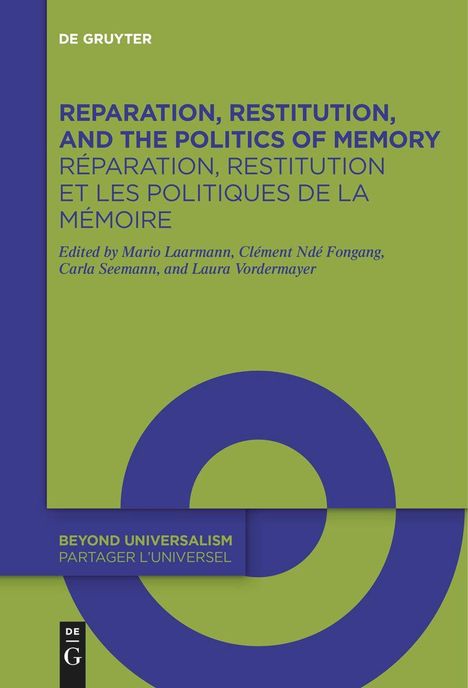Reparation, Restitution, and the Politics of Memory / Réparation, restitution et les politiques de la mémoire, Kartoniert / Broschiert
Reparation, Restitution, and the Politics of Memory / Réparation, restitution et les politiques de la mémoire
- Perspectives from Literary, Historical, and Cultural Studies / Perspectives littéraires, historiques et culturelles
(soweit verfügbar beim Lieferanten)
- Herausgeber:
- Mario Laarmann, Laura Vordermayer, Carla Seemann, Clément Ndé Fongang
- Verlag:
- De Gruyter, 11/2024
- Einband:
- Kartoniert / Broschiert, Paperback
- Sprache:
- Englisch
- ISBN-13:
- 9783111627823
- Artikelnummer:
- 11991695
- Umfang:
- 310 Seiten
- Nummer der Auflage:
- 24001
- Ausgabe:
- 1. Auflage
- Gewicht:
- 463 g
- Maße:
- 230 x 155 mm
- Stärke:
- 17 mm
- Erscheinungstermin:
- 4.11.2024
- Hinweis
-
Achtung: Artikel ist nicht in deutscher Sprache!
Weitere Ausgaben von Reparation, Restitution, and the Politics of Memory / Réparation, restitution et les politiques de la mémoire |
Preis |
|---|
Klappentext
Over the past roughly two decades, the interconnected concepts of reparation, restitution, and commemorative culture have gained renewed momentum ¿ in academic discourse as much as in activist, artistic, and political contexts. This development insists on a critique of the material and systemic conditions of societies and global relations. In their 2018 report on the restitution of looted cultural artifacts, for example, Bénédicte Savoy and Felwine Sarr discuss restitutions in the light of a new ethics of relations. Individual acts of restitution, but also the processes of material and immaterial reparation that go with them, are viewed as mediators in the by definition irreparable legacy of colonialism and its present repercussions. A new ethics of relations might even go beyond anthropocentrism: The destruction of nature in the Anthropocene and the destruction of humanity that is colonialism both require a fundamental questioning of the premises of western modernity and a radically different relationship to the world. The present volume aims to examine different discourses and practices of reparation, bringing together perspectives from cultural studies, memory studies, post- or decolonial studies as well as literary studies. Chapters from these disciplines are complemented by contributions from the fields of philosophy, art, and literature in order to explore the multiple facets of reparation.
With contributions by Kader Attia, Lucia della Fontana, Ibou Coulibaly Diop, Alexandre Gefen, Hannah Grimmer, hn. lyonga, Helena Janeczek, Markus Messling, Clément Ndé Fongang, Aurélia Kalisky, Fabiola Obame, Angelica Pesarini, Aurore Reck, Olivier Remaud, Patricia Oster-Stierle, Sahra Rausch, Igiaba Scego, Ibrahima Sene, Christiane Solte-Gresser, Jonas Tinius.

